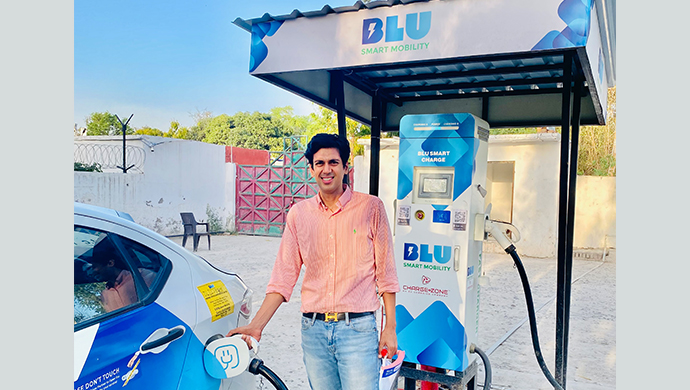
India is home to 1.3 billion people on the earth and is currently the 6th largest economy. Being a developing economy with huge potential to be one of the most promising markets for businesses around the world, India is slated to rise to the zenith. However, India needs to make sure its development story does not lead to the rise of the country’s collective carbon footprint in the world and ultimate contribute to climate change which has already wreaked havoc on this planet on unimaginable scales.
India presently emits 7.1 per cent of our global emissions and has 60 per cent lower per capita emissions than the global average. India has set ambitious targets for itself in the Nationally Determined Contributions according to the UNFCCC Paris Climate Agreement. India intends to reduce the emissions intensity of the GDP by about a third and has promised that a total of 40% of the installed capacity for electricity will be from non-fossil fuel sources.
With increased digital connectivity across the vast swathes of rural India and more Indians becoming job creators by reaping the benefits of the digital economy, the growth trajectory of India is experiencing a shift. While the government has launched many initiatives like the Bharat Net program, Digital India mission, or the recently launched e-RUPI app, the Indian entrepreneurial spirits are also not left behind.
Let us look at some examples:
Hesa

The heart of India resides in the villages. The rural economy which is largely dependent on agriculture or agro-based industries contributes 45 per cent of the National Income. Despite government interventions, rural India faces problems like lack of access to credit and lack of formal employment opportunities. In such conditions Hesa, a B2B platform intends to bridge the gap between the benefits enjoyed by the urban population and the underserved rural population by connecting the brands to the rural marketplace.
Founded by Vamsi Udayagiri and Hema Nandiraju in 2020, Hesa is a one-stop solution for corporates, banks, governments, and NGOs to explore and invest in rural India. Hesa aims to connect 650k villages over India ‘phygitally’, that is, by marrying the benefits of physical relationships which are generally valued in rural India, and the efficiency of digitisation.
Also read: Angel Investors: leading the charge for startup growth in Thailand
A team of over 8000 Hesaathis are spread across villages in three states. They help in managing the supply chain at the village level, handles banking transactions, facilitates village level mapping and surveys, and creates rural visibility for brands.
Today, with the help of Hesa e-Wallet, 1.1 million women SHG members of Telangana are able to access payback instantly through the Stree Nidhi initiative. Similarly, 2 million farmers have got the benefit of Big Haat, an online agri-market place.
BluSmart

Delhi has earned the epithet of being India’s most polluted city. Every year, after Diwali, we hear stories of smog cast across the skies of the national capital. The Delhi government has launched many initiatives like the Odd Even Scheme and Electric rickshaws to curb vehicular pollution. However, reducing air pollution calls for a congregative effort from all stakeholders and cannot be done by the government alone.
To make a difference and give a boost to electric mobility, BlueSmart started in 2019 as India’s first and largest zero-emission ride service.
Founded by Anmol Jaggi and Punit Goyal, BlueSmart operates a fleet of 400 cabs in the South Delhi-Gurugram region. It has also opened around 130 fast-charging stations for public use. Each of these has the capacity to charge 25-150 cars each.
BluSmart has completed 510,000 emission-free rides and covered 16 million emission-free kilometres, thereby saving 1000 tons of CO2 emissions. It promises zero ride denials, zero surge pricing, and the highest standards of safety and sanitisation.
Recently, BlueSmart has also increased the number of women driver-partners to 500 in Delhi and plans to increase it further to 50 per cent of the total driver base.
Zypp Electric

The pandemic has forced us to rely more on deliveries rather than stepping out and braving the virus. Even before, urban India has gotten used to getting groceries, food, clothing, and a host of items delivered to their homes. The home delivery market in India is expected to grow at a CAGR of more than 23% during the forecast period 2019-2025.
Akash Gupta and Rashi Agarwal founded Zypp Electric, a last-mile delivery company, in 2017 with a vision to ensure that the growth in the e-commerce industry does not lead to a simultaneous increase in carbon footprint. With expertise in AI and ML-enabled Tech platforms, the right EV technology, battery swapping infrastructure, IOT Zypp is able to carry on with last-mile deliveries in 10 cities.
Also read: How Malaysia’s Glueck Technologies is revolutionising data-driven technology in Southeast Asia
Today, Zypp is growing at a rate of 15 per cent month on month in revenue and has onboarded with major clients like Amazon, Flipkart, and Big Basket.
Charge+ Zone
Many ecologically aware and conscious commuters do think of shifting to electric vehicles. However, the absence of sufficient charging infrastructure, even in metro cities, provide a setback to potential buyers.
Founded by Kartikey Hariyani in 2018, Tesco Charge Zone has set up electric charging stations in various Indian cities like Delhi, Gurugram, Noida, Ahmedabad, Pune, Mumbai, and Hyderabad.
The mobile app, Charge+ Zone, provides a one-stop solution to locate charging points, book slots for charging,and payment through QR code which will bring in an ecosystem of unmanned charging stations that would be effective in times of pandemic where contactless service is usually preferred.
Charge+ Zone is already providing service for Ahmedabad Municipal Corporations and will be tying up with Patna city transport service in the near future.
The new normal
As we move past this economic downturn and propel our growth engine, it is necessary that our creative minds come together and shape a new normal. As a young country with increasing aspirations, we need to build capacities in a cost-effective way to make the transition to a green economy. This would ensure that we do not jeopardise our economic growth trajectory in the process of reducing our carbon footprint.
Also read: These Artificial Intelligence startups are proving to be industry game-changers
These startups will be pitching at the 9Unicorns Venture Catalysts demo day with other up-and-coming startups offering their own unique products and services. Join them on August 11 and 12 to connect with some of the most promising young startups in a virtual networking session. To learn more, visit their official page here.
– –
– –
This article is produced by the e27 team, sponsored by 9Unicorns
We can share your story at e27, too. Engage the Southeast Asian tech ecosystem by bringing your story to the world. Visit us at e27.co/advertise to get started.
The post How these four India-based startups are impacting the earth appeared first on e27.

